What a lucky kid. Seventh grader C is an active participant in our library’s summer reading club. Last year, his first year participating in the teen program, he won the big tech-focused prize: a Raspberry Pi setup. This year, he was one of the random drawing winners again, and selected the MakeyMakey*.

When he and his mom stopped by the library’s table at the Junior High’s registration night to tell me what he’d been up to with all of this tech, he was glowing, and his mom was excited too. And just what had he been up to? Building a media server for his house. With the prize he won from the library for reading books.
I asked him to come over to the library some time and chat about what he’d learned, and hoped he’d share his ideas on technology in the library. We had a really interesting conversation. I showed him the pieces that I’ve been collecting for our circulating technology collection, and he had some great ideas on how to promote the collection. There was definitely more than a spark of curiosity and hunger when I asked if he would help me figure out how to use the tools.
When I asked what he had learned while working with these tools, I expected to hear about how he’d learned a lot about programming in Linux. Or how he’d discovered some fun vintage games online while looking for ways to play with the Makey Makey. What I didn’t expect was an answer that we can all learn so much from.
“I would say, perseverance and problem solving. Definitely. Yeah.”
My librarian heart grew three sizes.

This is, of course, the “right” answer. It’s the one we hope for, and the one that here, at the Robot Test Kitchen, we believe in sincerely. But it’s not the answer we often hear the young people we work with repeat. We hear about the fun they had finding the vintage games. We hear about their new sills in Linux. And though we might see them persevering and problem solving, those aren’t the skills they can usually pull out as evidence of their learning. What made the difference here that allowed this teen to make and then verbalize that connection so unwaveringly? I think there are several elements at play here.
First, he has ready access to the tools he used. He had them in his home, and he had time to use them.The ability to approach the technology on his own terms, when he’s in the frame of mind to be open to trial and error is key. This is obviously not a possibility for a lot of teens. But an ongoing club setup or open Makerspace time at the library could provide similar access.
Second, he has a great support network at home. Both of his parents are involved in engineering, so he had people to bounce ideas around with, and more likely than not, he had someone to fish him out of the weeds if he got in too deep. Again, not all teens have this, but this is an area where that same club setup and the supportive co-learning environment of Makerspaces fills that need.
Third, he had open ended time and opportunity. There was no assignment and there was no deadline. Assignments and deadlines certainly have their place, but for this teen, the blank slate of opportunity allowed him to be creative, think about what he wanted and needed from the tech, play, revise, start over, settle in to the detailed work required, and finally triumph with a project that was meaningful.
I’ve been doing a lot of reading lately on the benefits of summer reading program for teens whose reading skills are more established and don’t slide over the summer like those still developing reading abilities. What I’ve learned is that more than minutes spent or pages read, the most significant impact for teens in developing a love of reading, or increasing the perceived value of reading, is engagement. It’s seeing that adults care that they are reading, want to hear about what they think of the books they find, and encourage and champion them to read more.
I believe that technology literacy is largely the same. If we can encourage engagement with the technology by providing time, access, and support, the minutes spent on tech and the lines of code created will likely increase. But more than those quantifiable results, the teens will want to come back to it because they will be developing those Assets that have proven to lead more teens into successful adulthood. It’s not about the tech. It’s not about the library. It’s about the people.
*I’d like to point out here that the total cost of the prizes he won this year is far less than many of the big draw prizes that some libraries offer. Another prize option, the gift card to the local book store, had a higher dollar amount. Sometimes -maybe most of the time- the biggest splash doesn’t come from the most expensive, shiniest tech.




